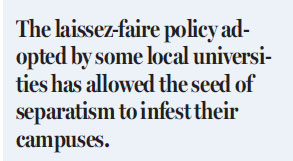Action needed to root out campus separatism talk
Updated: 2018-09-12 07:24
(HK Edition)
|
|||||||
The poisonous idea of Hong Kong independence encroaching upon local universities has sparked grave concerns in the society lately. Failure to snuff out the seed of separatism will have a detrimental effect on the learning environment in Hong Kong. Therefore, it is important for the government and universities to take prompt action to reinstate a school environment purely for academic purposes.
The beginning of a new academic year has seen the re-emergence of secession talk in some local universities. For instance, separatist statements such as "Hong Kong can truly serve the interests of its people only by gaining independence" was made by a student union leader during the opening ceremony of the Education University of Hong Kong; on the other side at the Chinese University of Hong Kong, the chairman of the student union described the Chinese mainland as "neighboring country" and "northern empire", and claimed that "Hong Kong independence is an option".
Both university administrators and education officials seemed to have handled the incident with kid gloves. For example, the EdUHK condemned the speech but merely referred to it as "deeply regrettable", whereas the CUHK only reiterated its stance of not supporting Hong Kong independence. The Education Bureau said students should not discuss separatism at the opening ceremony. Apparently disappointed by those weak responses, Leung Chun-ying, vice-chairman of the National Committee of the Chinese People's Political Consultative Conference, made a scathing remark, questioning what made it difficult for stakeholders to express their stern opposition to the acts of dividing the country instead of merely repeating the rhetoric of "not support". He stressed that advocacy of Hong Kong independence undermined national sovereignty and territorial integrity, thus should be flatly rejected.

In contrast, Chief Executive Carrie Lam Cheng Yuet-ngor walked tall when she responded to the incident. Not only did she express her regret to see the spread of separatism on university campuses and condemn those who messed up the otherwise solemn and dignified school opening ceremonies, but also unequivocally declared that their separatist speeches had constituted a violation of the "one country, two systems" principle and the Basic Law. She emphasized that the SAR government has zero tolerance toward anyone who challenges the "red line" drawn by President Xi Jinping.
The laissez-faire policy adopted by some local universities has allowed the seed of separatism to infest their campuses. Worse, connivance has emboldened those mavericks. For instance, on top of expressing his anti-Chinese sentiment with derogatory words on the campus last year, Ernie Chow Shue-fung, former chairman of the student union at CUHK, made personal attacks on mainland students who did not agree to separatist ideas. According to the undergraduate student handbook of CUHK, if a student has committed misconduct which is detrimental to the reputation and well-being of the university, he or she shall be disciplined by the Senate Committee on Student Discipline. The student in question could be suspended from part or all of the rights, privileges and/or the use of part or all of the facilities of the university for a specified period of time; given demerit(s), of which a total of three may result in termination of studies at the university; suspended from the university for a specified period of time; or terminated as a student from university. However, Chow was merely given a demerit together with an on-campus community service order by the disciplinary body.
Lam made clear three points when she denounced independence advocacy on campus. Firstly, it violated the "one country, two systems" principle and the relevant constitutional requirements stipulated in the Basic Law; the SAR government would not condone any action that disrupts the constitutional order. Secondly, she expressed her deep regret over the preposterous remarks by a few university students who took advantage of their status as a committee member of the student union. Thirdly, she encouraged the local institutions of higher education and students to speak up when they come across any irrational and illegal behavior, which would be dealt with according to the law by the SAR government.
The impact of Hong Kong independence advocacy is far-reaching and we should not procrastinate in rooting out all forms of separatism in the city. In particular, school campuses should be the primary target in the crusade against secession advocacy. University administrators should never overlook the severity of the issue and should implement punitive measures to deter offenders. I believe the SAR government will not remain on the level of voicing their objection, but will take action to deal with independence advocacy on school campuses according to law and ensure that no one would challenge the red line set by President Xi Jinping.
The author is a member of the National Committee of the Chinese People's Political Consultative Conference and chairman of the Hong Kong Youth Exchange Promotion United Association.
(HK Edition 09/12/2018 page8)